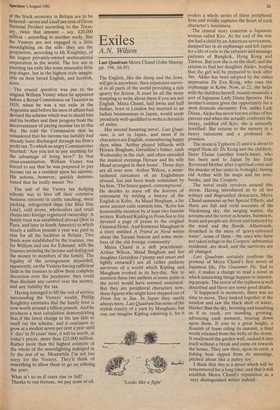Exiles
A.N. Wilson
Last Quadrant Meira Chand (John Murray pp. 194, £6.95) The English, like the damp and the Jews, will get in anywhere; their expatriate survival in all parts of the world providing a rich quarry for fiction. It must be all the more tempting to write about them if you are not English. Meira Chand, half Swiss and half Indian, born in London but married to an Indian businessman in Japan, would seem peculiarly well-qualified to write a chronicle of exiles.
Her second haunting novel, Last Quadrant, is set in Japan, and most if its characters are English, remembering happy days when 'Arthur played billiards with Horace Bingham, Geraldine's father, each Wednesday in the club, and often attended the musical evenings Horace and his wife Maud arranged in their home'. Those days are all over now. Arthur Wilcox, a moustachioed caricature of an Englishman abroad, has just been made redundant by his firm. 'The future gaped, contemptuous'. He decides to stave off the horrors of retirement by writing a history of the English in Kobe. As Maud Bingham, a far more ancient exile reminds him, 'Kobe has honourable mention by at least two famous writers. Rudyard Kipling in From Sea to Sea devoted a page of praise to the original Oriental Hotel. And Somerset Maugham in a story entitled A Friend in Need writes about the Tarumi beacon and some members of the old foreign community'.
Meira Chand is a deft practitioner. Arthur Wilcox, Maud Bingham and her daughter Geraldine ('plump and smart and tightly corseted') are all rather pathetic survivors of a world which Kipling and Maugham evoked in its hey-day. Not to mention these two authors at some point in the novel would have seemed unnatural. But they are peripheral characters now, these figures who might have stepped out of From Sea to Sea. In Japan they surely always were. Last Quadrant has none of the stylish cruelty of a yarn by Maugham; but one can imagine Kipling admiring it, for it evokes a whole series of these peripheral lives and vividly captures the heart of each character's loneliness.
The central story concerns a Japanese woman called Kyo. At the end of the war she had a child by an American serviceman, dumped her in an orphanage and left Japan for a life of exile in the cabarets and massage parlours of Bangkok, Hong Kong and Taiwan. But now she is on the shelf, and she returns to find her daughter Akiko, hoping that the girl will be prepared to look after her. Akiko has been adopted by the rather impressive Dr Eva Kraig, who runs the orphanage in Kobe. Now, at 22, she helps with the children herself, mutatis mutandis a sort of Japanese Lady Diana Spencer. Her mother's return gives the opportunity for a most dramatic encounter. For, unlike Lady Diana, Akiko has never known either of her parents and when she actually confronts the sleazy, raddled old Kyo, she is naturally horrified. She returns to the nursery in a heavy rainstorm and a profound depression.
The storm is Typhoon 21 and it is about to engulf them all: Dr Kraig and the children; Sister Elaine (another lonely-heart, who has been sent to Japan by her Irish Reverend Mother after a spiritual crisis and the murder of her sister in Armagh); boring old Arthur with his maps and his notebooks; and the Coopers.
The novel really revolves around this storm. Having introduced us to all her solitary and disgruntled characters, Meira Chand summons up her Special Effects; and there are full and vivid accounts of the blackening sky, the surging waters, the screams and the terror as houses, hutments, boats and people are driven and battered by the wind and the floods. Afterwards, drenched in the mess of 'gravy-coloured water', some of them — the ones who have not taken refuge in the Coopers' substantial residence, are dead; and the survivors are all changed.
Last Quadrant certainly confirms the promise of Meira Chand's first novel of Japanese life, The Gossamer Fly. Sad to say, it makes a change to read a novel in which interesting things happen to interesting people. The terror of the typhoon is well described and there are some good deaths.
'It happened in moments, there was no time to move. They looked together at the window and saw the black shelf of water, blacker than the sky, hovering and trembling as if to crash, yet standing, growing, advancing each moment, bearing down upon them. It rose to a great height, a flourish of foam riding its summit, a final wrath released from the belly of the storm. It swallowed the garden wall, sucked it into itself without a break and came on towards the house. They saw then, upon its crest, a fishing boat ripped from its moorings, pitched about like a paltry toy'.
I think that this is a novel which will be remembered for a long time; and that it will establish Meira Chand's reputation as a very distinguished writer indeed.


































 Previous page
Previous page